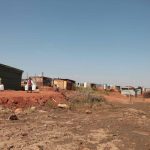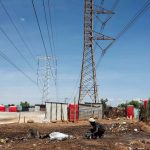Neglected, Alex resembles its old name of Dark City
Being situated next to Sandton, Africa’s richest patch, has not helped Alexandra township to develop. It remains a place of protest, illegal evictions and demolitions, and broken government promise…
Author:
31 July 2019

Twenty-five years after apartheid, Alexandra township north of Johannesburg remains a site of deep impoverishment, just a few kilometres from the glittering glass towers of Sandton. The lack of political will to attend to the grim conditions in what was once known as Dark City has slowed development chronically.
Following the resignation of DA ward councillor Werner Smit, the ANC won back ward 109 in a 24 July by-election. Does that mean the needs of Alex’s residents will be met or will political lethargy and ineptness continue to undermine and crush their self-organised efforts?
In the wake of protests and a shutdown around the continuing deplorable socioeconomic conditions in the township, the South African Human Rights Commission (SAHRC) Alexandra inquiry was set up to investigate if there has been a violation of rights as envisioned in the Bill of Rights, as well as corruption and maladministration. It was also mandated to investigate what led to the devastating demolitions in the township on 31 May.
Related article:
Obed Bapela, deputy minister of Cooperative Governance and Traditional Affairs (COGTA), told the Alex inquiry that the township would take at least 10 to 20 years to develop, announcing that there were plans to remodel it under the Integrated Urban Development Framework (IUDF) – a national initiative to manage urbanisation.
In the same week, Gauteng member of the executive council for human settlements Lebogang Maile said that the housing issue was complex, emotional and affected by many issues. He announced that the department was in the process of formulating a policy to counter land occupations because “people can occupy without fear because of lawlessness”.

Housing crisis
He said Alex, where he grew up, was characterised by lawlessness and stressed that the law needs to be enforced. Maile said those living “illegally” in Alex would be evicted but offered alternative accommodation, and the department would ensure that those who qualify are regularised and provided with housing.
Maile said that even after people are evicted, they reoccupy in no time and this has happened continuously because of a “failure to effectively govern” Alex. He said the provincial government would apply for a blanket court interdict as the need for a court order to evict people from occupied land has been hampering its ability to enforce by-laws.
Related article:
In response to the crisis in Alex, the City of Joburg announced on 23 June that it is preparing a proposal for its council in August to allow the expropriation of a number of abandoned factories, with the intention of handing them over to the private sector to be developed as housing. The areas identified, which include Alex, Kew, Devland and Rabie Ridge, are in dire need of housing.
At the same time, the provincial human settlements department has allocated R28 million to commence or complete four housing projects in 2019-2020. These are in River Park, Extension 31 and Nobuhle Hostel, and a subsidised housing project on Alex’s far east bank, called Botlhabela.
Gauteng Department of Human Settlements chief director Sthenjwa Ngcobo said Botlhabela would be designated 232 units; Extension 31, 84; and Nobuhle would provide 620 units of accommodation. Ngcobo could not give specific figures for River Park, which is occupied and will need to be rebuilt. “There needs to be planning and an assessment of how much the space will provide,” he added.
Maile said Alex is not a sustainable human settlement and is a historical and structural legacy of apartheid.
History of demolition and eviction
But while the state is seeking to build new forms of accommodation, it is also acting against people’s self-organised strategies to secure accommodation. At the end of May, more than 160 structures in Stjwetla, a shack settlement in Alexandra, were demolished. This left many people displaced and homeless when the Red Ants, the Johannesburg metro police and a privately owned company descended on the portion of occupied land in the swelling township in what turned into a brutal shack demolition.
Some residents had their possessions damaged and burned while others were allegedly beaten and shot with rubber bullets. EFF Gauteng leader Mandisa Mashego, who was there on the day, said that a number of police officers were not wearing identification while carrying out the eviction.
No court order was produced, there was no engagement, the demolitions were far from humane and no alternative accommodation was provided.
A resident said that when she tried to reason with the authorities, they did not want to talk.
Related article:
City manager Ndivhoniswani Lukhwareni was unable to explain who authorised the demolitions, saying that everything would be revealed in a forensic investigation.
He said that in a 22 September 2017 eviction in Univille in Lenasia, south of Johannesburg, they opted for a court order because they found that there was an occupation of land. But in Alex, the initial assessment of the area revealed that the majority of the structures there were incomplete and that those that had been completed were not occupied.
“So that does not fall under the court order route, the PIE [Prevention of Illegall Eviction from and Unlawful Occupation of Land] Act is applicable,” he said, adding that the City would be launching an investigation to determine from an independent third party if they used the applicable legislation and if it was properly interpreted.

Emotional demolition
Lukhwareni described what happened on 31 May as a demolition and not an eviction, saying it was emotional. “Demolition in practice is difficult, there will be resistance. In Univille, lives were lost and it’s not something we like doing,” he said.
In the evictions that led to a violent clash and two deaths, the Red Ants were deployed to demolish shacks on municipal-owned land that the ward councillor at the time, Vinay Choonie, explains was earmarked for a housing development.
The area in the south of Johannesburg flared up with protests on 23 July, with residents in bond-paying houses turning on those occupying land, and attacking them in the dead of night. The grievances and anger remain unresolved.
Across the country, with Cape Town and Durban being notable examples, municipalities are increasingly claiming that the shacks that they are demolishing are unoccupied, and therefore not subject to the law regulating evictions. In many cases, residents have strongly disputed that demolished structures were unoccupied and have often provided evidence to support their claims. In a number of instances, courts have found against municipalities using this line of argument to justify evictions.
Johannesburg’s mayor, Herman Mashaba, agreed to rebuild the demolished shacks in Alex, but remains mum on where the funding would come from and why he would rebuild structures deemed to be illegal.
In another development on 19 June, protestors who were part of the #AlexShutdown took to the streets of Sandton to hand over a memorandum to a representative at the Region E offices in the financial capital of South Africa. They were against the rebuilding of demolished illegal structures. Having failed to find the forms of engagement they were seeking, the residents resorted to road blockades in Sandton to disrupt the normal flow of traffic.
“Elections came and passed … they demolish[ed] the illegal structures in Marlboro and CoJ [City of Johannesburg] says it’s a mistake, and they promised to rebuild invader houses while Alex people are still waiting for houses … Mashaba decides to reward invaders,” said a point on the memorandum.




